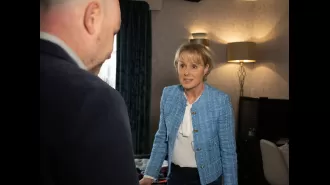Security agencies from the Five Eyes alliance are teaming up to combat youth terrorism in an unprecedented move.
16-year-old arrested for promoting violence against non-white individuals and calling for a race war to protect the white race.
December 5th 2024.

Intelligence agencies in Australia and its Five Eyes security partners have recently taken an unprecedented step to address a growing concern: the radicalization of young people. In an effort to combat this alarming trend, these agencies have come together to issue a call to action for a "whole-of-society" approach. This means involving not just law enforcement, but also parents, teachers, and healthcare workers in the fight against violent extremism.
Their joint report, titled "Young people and violent extremism: a call for collective action," marks the first time that ASIO and its counterparts in the US, UK, Canada, and New Zealand have collaborated on a public paper. By using case studies and statistics from all five countries, the report makes a compelling argument for the need for everyone to play a role in preventing young people from being radicalized, particularly through online content.
"We are increasingly concerned about the radicalization of minors and their involvement in terrorist activities," the authors write in the report, which was released overnight. "Radicalized minors can pose the same credible terrorist threat as adults, and law enforcement and security agencies cannot address this issue alone."
This joint effort to address youth radicalization is a clear indication of just how concerning, escalating, and pressing the issue has become, according to ASIO Director-General Mike Burgess. He notes that approximately 20% of ASIO's priority counter-terrorism cases involve young individuals. And sadly, this trend is reflected in the recent terrorist attacks, disruptions, and suspected incidents in Australia, where the alleged perpetrators were all young people.
"As a parent, the numbers are shocking. As an intelligence officer, the numbers are sobering," Burgess states in a released statement.
The Australian Federal Police (AFP) also weighed in, revealing that they have worked with the Joint Counter Terrorism Teams to charge at least 20 minors with Commonwealth or state-based offenses since 2020. One of these individuals was only 12 years old.
The report highlights two particularly concerning case studies from Australia, involving children aged 16 and 14. In the first case, authorities were so disturbed by the extremist materials the 16-year-old was sharing online that he was charged with advocating terrorism and ultimately jailed. The report notes that he had been discussing plans for a mass killing, live-streaming a shooting on social media, and even requesting assistance in bomb-making.
The second case involved a 14-year-old who had been posting on Snapchat about a planned school shooting, boasting about their access to firearms and explosives. After an investigation, police found evidence of a "nationalist and racist violent extremist ideology" and charged the minor with advocating terrorism and other offenses. They were ultimately sentenced to a two-year good behavior bond.
AFP Commissioner Reece Kershaw emphasizes the importance of limiting the availability of extremist material and educating individuals, including parents and teachers, to help prevent radicalization. He also points out that there are often connections between online platforms such as Discord, Telegram, and TikTok, where the same extremist videos are shared across multiple unrelated investigations.
The report concludes with a call for a renewed "whole-of-society approach" to combat this threat. It stresses that this is not something that can be addressed by governments or communities alone, but requires a collaborative effort. The report also highlights the need for mental health support, community initiatives, social services, and education interventions to counter radicalization before it escalates to the point of requiring security and policing responses.
In the end, the report warns that violent behavior and extremist content are becoming increasingly normalized online, with individuals joking about terrorist attacks and creating violent content. It stresses that radicalization can occur both online and in person, and that violent extremist content is more accessible and impactful than ever before. It is clear that urgent action is needed to prevent young people from falling prey to this dangerous trend of radicalization.
Their joint report, titled "Young people and violent extremism: a call for collective action," marks the first time that ASIO and its counterparts in the US, UK, Canada, and New Zealand have collaborated on a public paper. By using case studies and statistics from all five countries, the report makes a compelling argument for the need for everyone to play a role in preventing young people from being radicalized, particularly through online content.
"We are increasingly concerned about the radicalization of minors and their involvement in terrorist activities," the authors write in the report, which was released overnight. "Radicalized minors can pose the same credible terrorist threat as adults, and law enforcement and security agencies cannot address this issue alone."
This joint effort to address youth radicalization is a clear indication of just how concerning, escalating, and pressing the issue has become, according to ASIO Director-General Mike Burgess. He notes that approximately 20% of ASIO's priority counter-terrorism cases involve young individuals. And sadly, this trend is reflected in the recent terrorist attacks, disruptions, and suspected incidents in Australia, where the alleged perpetrators were all young people.
"As a parent, the numbers are shocking. As an intelligence officer, the numbers are sobering," Burgess states in a released statement.
The Australian Federal Police (AFP) also weighed in, revealing that they have worked with the Joint Counter Terrorism Teams to charge at least 20 minors with Commonwealth or state-based offenses since 2020. One of these individuals was only 12 years old.
The report highlights two particularly concerning case studies from Australia, involving children aged 16 and 14. In the first case, authorities were so disturbed by the extremist materials the 16-year-old was sharing online that he was charged with advocating terrorism and ultimately jailed. The report notes that he had been discussing plans for a mass killing, live-streaming a shooting on social media, and even requesting assistance in bomb-making.
The second case involved a 14-year-old who had been posting on Snapchat about a planned school shooting, boasting about their access to firearms and explosives. After an investigation, police found evidence of a "nationalist and racist violent extremist ideology" and charged the minor with advocating terrorism and other offenses. They were ultimately sentenced to a two-year good behavior bond.
AFP Commissioner Reece Kershaw emphasizes the importance of limiting the availability of extremist material and educating individuals, including parents and teachers, to help prevent radicalization. He also points out that there are often connections between online platforms such as Discord, Telegram, and TikTok, where the same extremist videos are shared across multiple unrelated investigations.
The report concludes with a call for a renewed "whole-of-society approach" to combat this threat. It stresses that this is not something that can be addressed by governments or communities alone, but requires a collaborative effort. The report also highlights the need for mental health support, community initiatives, social services, and education interventions to counter radicalization before it escalates to the point of requiring security and policing responses.
In the end, the report warns that violent behavior and extremist content are becoming increasingly normalized online, with individuals joking about terrorist attacks and creating violent content. It stresses that radicalization can occur both online and in person, and that violent extremist content is more accessible and impactful than ever before. It is clear that urgent action is needed to prevent young people from falling prey to this dangerous trend of radicalization.
[This article has been trending online recently and has been generated with AI. Your feed is customized.]
[Generative AI is experimental.]
0
0
Submit Comment





